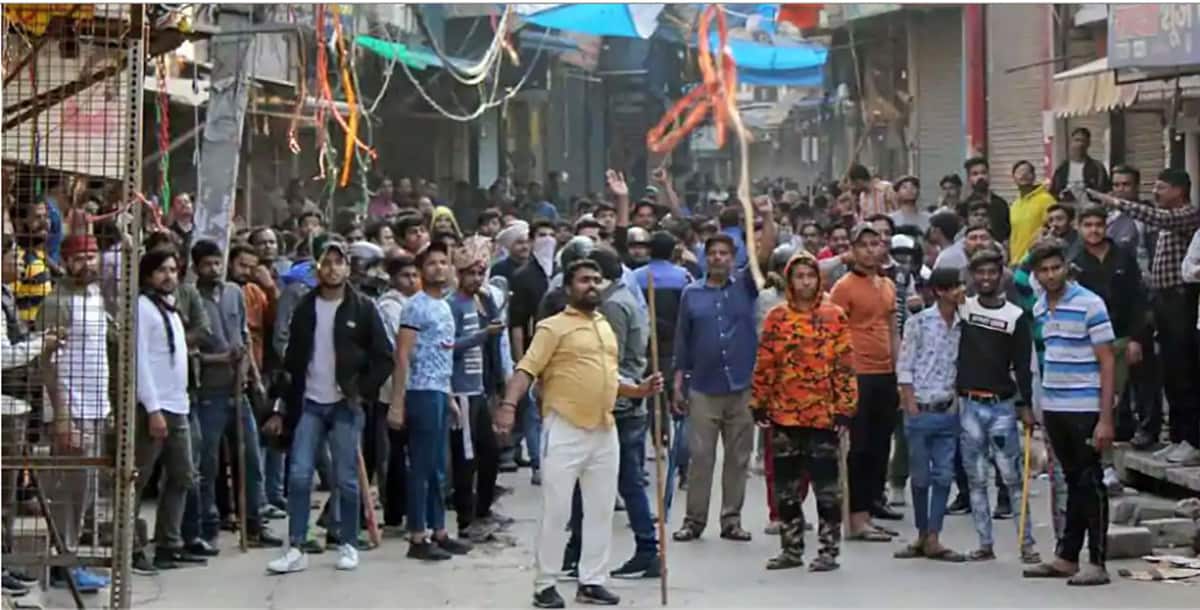Abhishek Dey
Around 7 pm on Tuesday, a large posse of security personnel marched towards Chand Bagh, a Muslim-dominated locality in north-east Delhi, as reports of violence reached their wireless sets. In another half-hour, an armed mob gathered near a petrol pump in Gokalpuri and torched two vehicles, forcing the police to send a fresh deployment in the neighbourhood, less than 2km from Chand Bagh.
It continued over 24 hours as the violence spread from the Main Jafrabad Road and localities in vicinity to the large maze of narrow interconnected lanes across north-east Delhi in the last 24 hours.
On several occasions, as the epicentre of the violence kept changing within a 5-km radius from time to time throughout Tuesday – rioters could often be spotted dispersing on being chased by the police and rapid action force teams, disappearing in the lanes and then re-appearing as a group behind police teams.
What started on Sunday as a clash between groups opposed to and supporting the amended citizenship law within a kilometre stretch in Jafrabad snowballed into a full scale communal riot by Tuesday. Shooting, arson and stone pelting was reported from several areas on Tuesday, including Maujpur, Chand Bagh, Kardampuri, Bhajanpura, Gokalpuri, Khajoori Khas, Yamuna Vihar and Brijpuri – pockets that are spread across the main road where protesters ran riot on Monday, shooting and pelting stones at each other, burning shops and houses and attacking media personnel.
By Tuesday night, as many as 13 persons died and over 250 injured. Several of them sustained bullet injuries. The nature of violence though remained the same on Tuesday but it spread to a much larger area, indicating a complete failure on part of the police and security agencies to contain the rioters.
“I don’t know why you people call it violence. People feel threatened and, hence, they are responding,” said Narayan Bansal, a resident of Brijpuri who was part of a group standing close to a torched vehicle in the area.
By 8pm, all lights on the arterial road that connects the Yamuna Pushta region with Loni in Ghaziabad-Delhi border – passing through Bhajanpura, Chand Bagh, Yamuna Vihar, Brijpuri and Gokalpuri – were switched off. Several security officials deployed on the stretch claimed that it prevented them from being targets of the armed mobs.
However, several residents in the localities debunked that logic. “The lights were switched off only to help the rioters. The police did nothing to stop them and the darkness helped them to pretend that they did not learn about violence,” said Gulfam Chaudhary, a resident of Chand Bagh whose neighbour’s house was set ablaze by a mob.
BYPL, the local power discom, did not reply to repeated calls seeking a comment on who switched off the lights.
In Gokalpuri, where rioters set ablaze a tyre market late Monday night, a car accessory market was burnt on Tuesday. In most cases, the rioters blocked roads for fire tenders. Delhi’s fire department chief Atul Garg said that 70 fire incidents were reported in the area on Tuesday. Five fire trucks were damaged.
Things turned bad in the afternoon when a fire tender driver was thrashed by a mob in Gokalpuri, following which other fire truck drivers said that they would not attend calls in the area unless assured of security by the police. Garg confirmed the incident.
Around the same time, mobs also stopped private vehicles on the road, identified drivers and occupants by their religion and thrashed them. HT met several of them on the Gokalpuri – Yamuna Pushta stretch on Tuesday.
“It was around 20 of them. They asked us our names, snatched our documents and started thrashing us. They damaged the vehicle too,” said Mohammad Nawab, who ferries goods from the Bawana industrial area to markets in the trans-Yamuna region. Nawab was bleeding from his nose and head.
Several shops in Bhajanpura were looted with rioters breaking the shutters and windows and stealing the stuff. In Khajoori Khas, many vehicles were torched.
One of the most densely populated working class neighbourhoods in Delhi, the areas around the Main Jafrabad Road, also knows as Asharam Tyagi Marg, have witnessed several skirmishes and riot-like situations. In December last year, thousands had gathered on the main road to protest against the CAA and pelted stones at the police. In September 2006, the area had erupted in protest against the sealing of illegal commercial spaces. Massive stone pelting had taken place then and three people died in police firing.
However, the violence over Monday and Tuesday is unprecedented for the area since it has never witnessed a full-scale communal riot. Roughly 25 lakh people live in the area in plot sizes as smaller as 25 yards or 20 square metres. Over five decades, what was a slum area has proliferated into a massive human settlement. There are mixed pockets of Muslim as well Hindu population in the area.
When a local resident in Maujpur was spotted recording the violence from his terrace, pro-CAA men pelted stones at him until he was hit and he chanted religious slogans to prove he was one of them. The mob broke his door, but called off any further attack.
In Brijpuri, some political leaders had organised a “peace march” around 2 pm. Several locals claimed that the situation went worse after that. While those on the Hindu-dominated pockets said that the Muslims hurled stones at them during the march, those in the Muslim pockets said that the Hindus vandalised their houses during the march. Around 4 pm, lanes in both Hindu and Muslim pockets of Brijpuri and neighbouring localities had broken glasses, torched buildings and vandalised shops.

